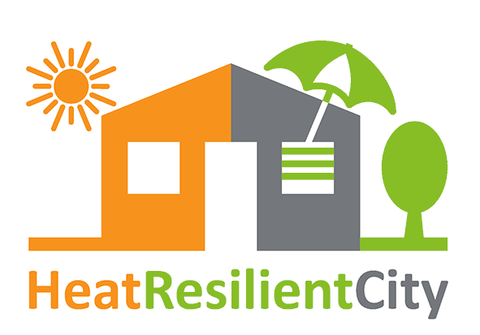Project HeatResilientCity (HRC)
HeatResilientCity (HRC)
Heat resilient development of cities and urban districts – knowledge generation with a focus on local residents and implementation in Dresden and Erfurt
Sub-project TUD: Meteorological und biometeorological effects in heat-stressed urban districts
Project duration: October 2017 – September 2020
Project description:
The sub-project of TU Dresden aims to identify and quantify factors for the current and future thermal stress in specific districts of the cities of Dresden and Erfurt. Climate data from the local (ca. 3 km) to small scale (buildings) will be provided as a main project result – for users in the joint project and for later applications on district level.
For this purpose, data from a mesoscale climate model and regionalised station-based data will be reprocessed for several periods for the cities of Dresden and Erfurt. Based on these data, grid-based mean and extreme reference summer periods for past, present, and future will be derived for the considered districts and their surroundings as input for the applications in the joint project. Using well-established statistical approaches from literature as well as derived by microscale model simulations, the urban effect on climate data will be considered: first the mean Urban Heat Island (UHI) effect for the specific city is added to the climate data, second the UHI is modified by specific characteristics of the city districts (topography, current and future distribution of structure parameters like sky view factor, building height, street width, degree of surface sealing). To evaluate the effect of a changing city planning (e.g., densification of dwelling zones, change of green areas) on bio-climate, the thermal exposure of habitants is determined under extreme summer weather conditions using well-established indices (PET, UTCI) and the microscale models. The simulated data will be evaluated with measurements and are freely usable for non-commercial and public applications.
Further Information:
Working group at the Chair of Meteorology, TU Dresden:
Dr. Astrid Ziemann (research associate), Dr. Valeri Goldberg (scientific supervision), Prof. Dr. Christian Bernhofer (project leader)
Co-operation partners:
Leibniz-Institut für ökologische Raumentwicklung e. V. (Koordination), Fachhochschule Erfurt, Landehauptstadt Dresden, Landeshauptstadt Erfurt, Hochschule für Technik und Wirtschaft Dresden, Eisenbahner-Wohnungsbaugenossenschaft Dresden eG
Associated partners:
Stadtwerke Erfurt GmbH, Thüringer Landeszeitung, Sächsische Zeitung, Brechmann Liegenschaftsverwaltung Erfurt, Thüringer Energie und GreenTech-Agentur

Comparison of the sensors on the measuring field Tharandt

Measurements with backpack
Publications:


